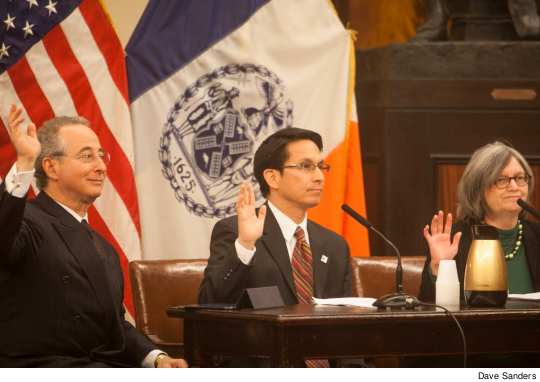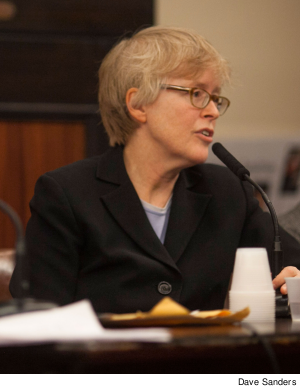 |
For more Pathways coverage in this issue of Clarion, read personal testimony from PSC members at the City Council hearing, find out about the status of lawsuits and share your own personal story on how Pathways’ is affecting your classroom.
The City University of New York’s controversial Pathways curriculum came under the City Council’s microscope February 25, with the administration defending itself against widespread dissatisfaction from its faculty and confusion from its students over the new standards.
The PSC testified in protest against the curriculum, which the administration says is designed to smooth transfers between CUNY schools. The union has launched lawsuits and a vote of no confidence in Pathways, calling it “austerity education” that exists only to move students through college more quickly and boost graduation statistics, rather than provide quality teaching.
A Diminished Degree
“The reason faculty voted no confidence is that we believe the Pathways curriculum degrades education for CUNY students,” PSC President Barbara Bowen told the council. “It’s part of a national agenda which we also see in K-12 education that focuses on standardization and testing rather than quality and teaching.”
The hearing was convened by new Council Higher Education Committee Chair Inez Barron, who questioned CUNY’s motivations in implementing Pathways, and expressed concern with “whether it’ll diminish the value of a CUNY degree.”
CUNY’s Interim Executive Vice Chancellor, Julia Wrigley, said that individual schools had bristled at Pathways because they were used to setting their own curricula, but that the increased rate of transfer between CUNY programs (about 29% of freshmen in total) necessitated a University-wide change.
“We’re hopeful that as Pathways continues, faculty will increasingly recognize that they maintain a fundamental control of the curriculum,” she said. “We are hopeful that as this change settles in to the University, people will recognize that it does not strip the faculty of their fundamental prerogatives.”
When confronted with the 92% vote of no confidence organized by the PSC, in a referendum conducted by the American Arbitration Association last May, Wrigley said, “Among those who voted, it was a high level of negative vote, but many faculty members did not vote,” prompting cries of anger from the council gallery.
Bowen later noted that “there was an extraordinarily high level of participation by the full-time faculty,” with nearly two-thirds voting.
Wrigley said she was hoping to understand the issues faculty have with Pathways to tweak it moving forward, but stood by the program as the future of the University.
 |
“I think that making the University a more integrated university has been helpful,” she said. “We’ll look at whether students in practice have been able to take their courses with them… We want to understand what the issues are for faculty members and students and colleges.”
Bowen said Pathways was part of a growing trend obsessed with increasing “college-completion” stats around the nation. “We make a serious error of scale if we think of Pathways as purely a CUNY phenomenon…. CUNY is attempting to make sure that the university measures up.”
Austerity Education
The real solution, she said, would be adequate funding. “We believe that Pathways is an accommodation to underfunding and the only response is to insist on full funding…. However benign the goal of improving graduation rates, Pathways is not politically innocent. It is about graduating more students in a shorter time at lower cost.”
Nivedita Majumdar, an associate professor of English at John Jay College, explained how Pathways had confused her and her colleagues because of a “lack of democratic participation” in its creation.
“The reduction in the general-education curriculum ensures that our students are denied a well-rounded liberal-arts education,” she said. “It means students could graduate with a bachelor’s degree without ever having taken a literature or a history course or without any training in a foreign language or with reduced time in science labs.”
______________________________
Originally published in The Chief, New York City’s civil service weekly.

